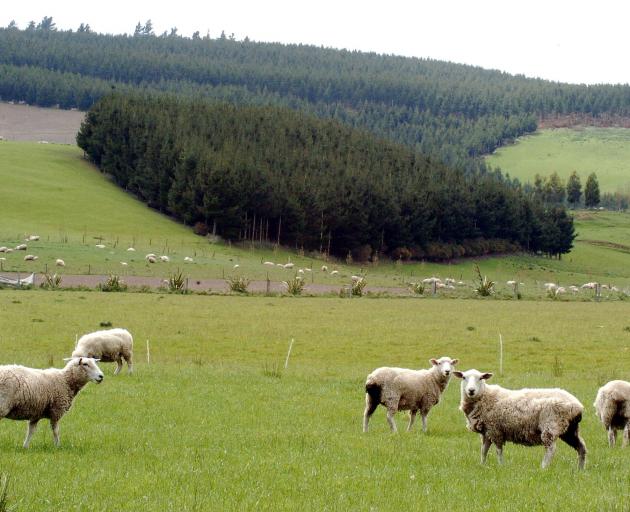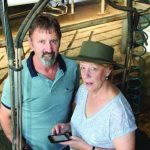
Nutricia Karicare toddler sheep milk powder will be 100 per cent New Zealand sheep milk from Maui Milk, which operates two farms on the western shores of Lake Taupo.
And Danone plans to launch a full sheep milk formula range next year under the Nutricia brand.
The new toddler formula is currently available only in Australia because of the limited milk supply from the Maui supplier, the company said. Hopefully it would be on New Zealand shelves next year after the full range was launched.
The breakthrough for the Waikato sheep milk processing industry also signals possible significant conversions to sheep milking by dairy farmers, as Maui Milk and Nutricia start a hunt for more supply.
Nutricia ANZ sales director John Hoare said the new offer is a response to growing demand among Australian and New Zealand consumers for toddler formulas based on alternative sources of milk such as sheep and goat milk.
With the planned launch of a full sheep milk product range next year, the search has started for more dairy sheep farmers in the greater Waikato.
Maui Milk, formed five years ago, is seeking new supply within two hours of Hamilton, where its sheep milk is processed at the Waikato Innovation Park.
Maui general manager Peter Gatley said there is interest from sheep and beef farmers around Taupo, Rotorua and the King Country – but mostly from Waikato dairy cow farmers.
“Comparison with a typical Waikato dairy farm shows a better return per hectare, especially on smaller farms in the 50-80 hectare range,” he said.
“The system is all grazing, no barns are required and the lactation is shorter than for cows. A lot of farmers are also attracted because the environmental footprint is similar to traditional beef and sheep farming.
“Conversion from dairy cattle is low cost and we are offering multi-year contracts at a payout equivalent to $3 per litre.”
Gatley said the company can supply pregnant ewes during winter so a farm can dry off the cows in autumn and be milking sheep in spring.
Nutricia’s Hoare said his company also aims to engage farmers in the greater Waikato region to help meet demand.
Maui Milk was started to offer alternative milks to people who find cow’s milk hard to digest, a particular issue in Asia, the company said.
Chairman Paul McGilvary said whole milk powder already sold under the Maui brand had been a stepping stone and an expanded product range was always planned.
The company was working on complementary products to sell under its own brand.
“Whatever form the product takes, we see grass-fed sheep milk as the perfect fit for brand New Zealand. It’s what we’re famous for. Grass. Sheep. And milk,” said McGilvary.
Maui Milk runs 6000 ewes.
Processing plant
Meanwhile, construction is well under way at the Waikato Innovation Park at Hamilton’s Ruakura of a new processing plant expected to deliver $129 million in sheep milk export products a year.
The $50m spray dryer plant on the campus of the business park is being built by Melody Dairies, a four-way investment partnership, whose major customer will be Spring Sheep NZ, a nutrition company which exports high-value branded food products made from sheep milk.
Growing global demand for sheep milk products has spurred the project, which will rise beside Food Waikato’s existing spray dryer at the business park.
The new dryer will be operational by February and increase jobs at the Ruakura processing site from 17 to 35.
The Melody Dairies investors are Pamu, formerly Landcorp, with 35 per cent, Nu-Mega Ingredients, a company owned by Australian listed Clover Corporation, also with 35 per cent, Dairy Nutraceuticals with 20 per cent, and Food Waikato with a 10 per cent share.
Pamu is a shareholder in Spring Sheep Milk, the biggest customer of the existing dryer at the park.
Spring Sheep has said the global sheep milk industry was estimated to be worth US$8 billion ($11.6b) at the farm gate and US$30b at retail.
The industry was growing rapidly with Asia currently the biggest consumer of sheep’s milk.
An ancient milk, it remains popular in Europe, particularly in France, Greece, Spain, Netherlands, Sardinia and the Middle East, Spring Sheep said.
Overseas. sheep milk is mostly consumed as cheese but was increasingly being used in yoghurts, liquid milks, butter, ice cream, gelato, nutritional foods and beverages.
Innovation park chief executive Stuart Gordon has said the new dryer would deliver an estimated $129m in sheep milk exports a year.





















